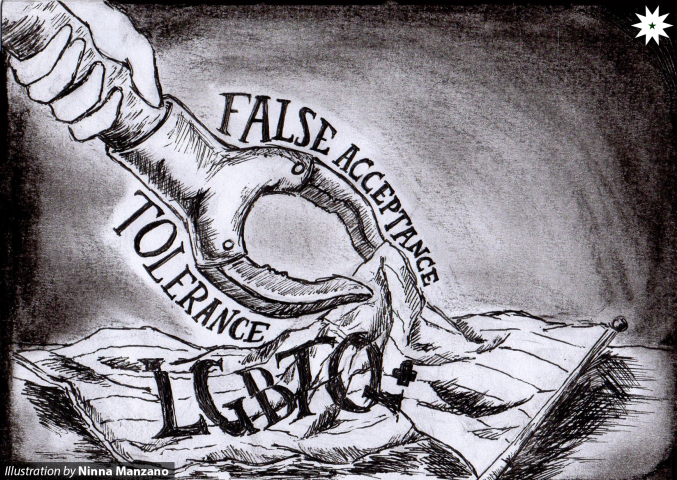When discussing the Philippine LGBTQ+ community and the sentiments toward them, a question usually raised is, “How accepting of the LGBTQ+ community is the Philippines?” The Philippines is considered as one of the most gay-friendly countries globally according to an article written by the Philippine Daily Inquirer in 2013. But just last year, a Social Weather Stations survey reported that 61 percent of their 1,200 respondents strongly opposed the civil union of same-sex couples in the country.
Perhaps a lot has changed in a year.
In May, a poll of a much larger scale from the House of Representatives about legalizing same-sex unions showed that the previous stance of the Filipinos has been overruled. Although initially the majority of the respondents sided with the belief that allowing same-sex unions is “wrong”, the last documented update before the poll was closed showed that the tables were turned. As of May 30, 63 percent of the total tally of 676,492 votes supported giving same-sex couples the right to marry.
Even before the poll was closed, many debated on the implications of both the poll itself and its supposed intent. Before the results shifted toward a supportive stance, some members of the LGBTQ+ community spoke out against how the aforementioned poll reduced policy-making for the community’s civil rights to a mere “people’s choice” online assessment. Not only that, many members of the LGBTQ+ community were disheartened to see that a significant number of the people who answered the poll did not believe they deserved the civil right to marry their same-sex partner.
Given the sensitivity of the topic and the situation in the country, responses such as those that disagree with same-sex unions do not seem uncommon. It is, to some extent, a wakeup call to see that the Philippines may not be as “gay-friendly” as its reputation.
All in all, the Philippines’ political climate with regard to addressing the concerns and the plight of the LGBTQ+ community can be summed up by remarks made by the country’s head. Most recently, President Rodrigo Roa Duterte implied that he “cured himself of being gay” by meeting a woman and establishing a relationship with her. Although it can be assumed he made that comment in an effort to be more tolerant and accepting of the LGBTQ+ people by saying that he, too, was part of the community but he “cured himself”, his comment shows the depth of how lacking his understanding of the community really is.
The implication that “being gay” can be cured goes against validating the existence of the LGBTQ+ community. “Being gay” cannot be “cured”. The assumption that “being gay” is treatable just like a disease is detrimental to the progress that the LGBTQ+ has made in terms of how society is making more of an effort to educate themselves about the community.
Last May, Atenean bar topnotcher Sean Borja made waves online when he used his position to be more vocal about LGBTQ+ rights in the country. Many were vocal about their disapprovement and took to using social media to explain why they believed the LGBTQ+ community were wrong in being proud of their identities. However, there were many more who applauded Borja and supported him using his platform for the community and wishing him well.
Nevertheless, this goes on to prove that as a country, the Philippines still has a lot to go before truly accepting the community. Acceptance, after all, does not only manifest in simple remarks and sharing of posts online. Treatment of the LGBTQ+ community in the country as fellow human beings and as fellow Filipinos should come first.
Explicitly, Section 1 of the Bill of Rights states that we should uphold the rights of every Filipino regardless of age, sex, religious beliefs, etc. Yet, why is there still a need to wait for new laws and policies just to give the LGBTQ+ community the rights that should be innate—rights that we all were supposedly born with?
Last 2017, the Philippine Congress passed the House Bill No. 4982 or the “Sexual Orientation or Gender Identity or Expression (SOGIE) Equality Act” which aims to protect the rights of every person regardless of sex, age, class, status, ethnicity, disability, religious, political beliefs, sexual orientation, gender identity, and expression from any form discrimination. The Senate, on the other hand, has caused the bill to be in the state of interpellation due to several senators being against its enactment.
While our government has made efforts to be more inclusive toward the LGBTQ+ community, it has, at the same time, stagnated and halted our progress in making Filipinos realize that the LGBTQ+ are just as human, are just as Filipino.
June is the month of Pride and it is the same month we commemorate Independence Day. Hopefully come June 12, the LGBTQ+ flag will be carried and waved with long due respect and honor alongside the Philippine flag. Let them symbolize both the “free” and those still imprisoned by false acceptance and unprogressive thinking.

